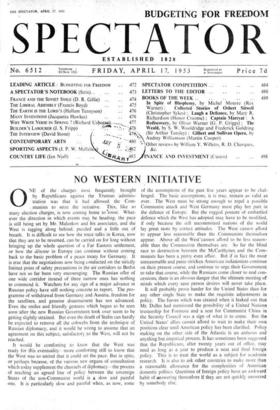NO WESTERN INITIATIVE 0 NE of the charges most frequently
brought by Republicans against the Truman adminis- tration was that it had allowed the Com- munists to seize the initiative. This, like so many election charges, is now coming home to "roost. What- ever the direction in which events may be heading, the pace is still being set by Mr. Malenkov and his associates, and the West is tagging along behind, puzzled and a little out of breath. It is difficult to see how the truce talks in Korea, now that they are to be resumed, can be carried on for long without bringing up the whole question of a Far Eastern settlement, or how the détente in Europe can continue without coming back to the- basic problem of a peace treaty for Germany. It is true that the negotiations now being conducted on the strictly limited rioint of safety precautions in the air corridors to Berlin have not so far been very encouraging. The Russian offer of One wide corridor instead of three narrow ones has nothing to commend it. Watchers for any sign of a major advance in Russian policy have still nothing concrete to report. The pro- gramme of withdrawal from Germany and Austria, freedom for the satellites, and genuine disarmament has not advanced. Even the- smiles and friendly gestures which began to be seen soon -after the new Russian Government took over seem to be getting slightly strained. But even the death of Stalin can hardly be expected to remove all the cobwebs from the technique of Russian diplomacy, and it would be wrong to assume that an agreement on this subject, satisfactory to the West, will not be reached.
It would be comforting to know that the West was ready for this 'eventuality—more comforting still to know that the West was so united that it could set the pace. But in spite, or perhaps because, of the various new organs of consultation which today supplement the channels of diplomacy—the process of reachnig an agreed line of policy between the sovereign States of the non-Communist world is a slow and painful one. It is particularly slow and painful when, as now, some of the assumptions of the past five years appear to be chal- lenged. The basic assumptions, it is true, remain as valid as ever. The West must be strong enough to repel a possible Communist attack and West Germany must play her part in the defence of Europe. But the rugged posture of embattled defence which the West has adopted may have to be modified, if only because the still uncommitted nations of the world lay great store by correct attitudes. The West cannot afford to appear less reasonable than the Communists themselves appear. Above all the West cannot afford to be less reason- able than the Communists themselves are. So far the blind race to destruction between the McCarthyites and the Com- munists has been a pretty even affair. But if in fact the most unreasonable and panic-stricken American isolationists continuo on their present course, and continue to urge their Government to take that course, while the Russians come closer to real con- cessions, there is an obvious danger that the ultimate meeting of minds which every sane person desires will never take place.
It will probably prove harder for the United States than for any other single State to make the requisite adjustments in policy. The furore which was created when it leaked out that Mr. Dulles had mentioned the possibility of a United Nations trusteeship for Formosa and a seat for Communist China in the Security Council was a sign of what is to come. But the United States' allies cannot afford to wait to make their own positions clear until American policy has been clarified. Policy making on the other side of the Atlantic is an arduous and anything but empirical process. It has sometimes been suggested that the Republicans, after twenty years out of office, may need as long as a year to produce a neat and final foreign policy. This is to treat the world as a subject for academia research. It is also to ask other countries to make more than a reasonable allowance for the complexities of American domestic politics. Questions of foreign policy have an awkward - habit of4enswering themselves if they are not quickly answered by somebody else.


































